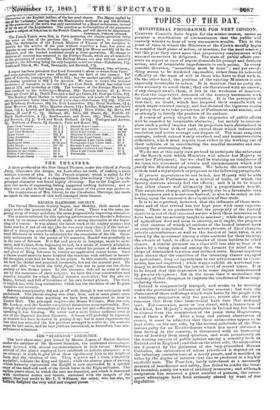SACRED HARMONIC SOCIETY.
The Sacred Harmonic Society began, last Monday, their second cam- paign under the generalship of Marshal Costa. There was the same im- posing array of troops as before, the same progressively improving discipline.
The oratorio selected for this opening performance was Handel's Solomon; a work by no means calculated to make a strong impression at the begin- ning of a season. It was almost the latest work of the mighty master; and bears marks, if not of old age, (for he was only sixty-three) of the infirmi- ties of a decaying eonstituti-41: he soon afterwards fell into the state of total blindness in which he continued for the remainder of his life. Gene- rally unfortunate in the poems of his oratorios, Handel was peculiarly so in the case of Solomon. It is flat and prosaic in language, mean in senti- ment, and written, from beginning to end, in a strain of courtly adulation, which raises the suspicion that the poet wished his praises of the wisdom and glory of King Solomon to receive an application nearer home. Such a theme could scarcely have inspired the musician with sublime or beauti- ful thoughts, even had he been in his prime. In this oratorio, accordingly, we find the skilful and practised harmonist, but not the musical poet. He WU still able "to build the lofty/tee:le," but not to pour out the divine melody of his former years. In the choruses, debased as some of them are by the meanness of their subjects, we have the clear construction and massive breadth for which Handel remains unrivalled; but the airs are heavy, formal, and full of iterationstaf his own former phrases. The work is loaded, too, with long recitatives; which tax the elocution of our English vocalists too severely. Solornos, consequently, did not go off well, though it was extremely well performed. The-chorus-singing was clear, firm, and in some places more delicately subdued than anything we have been accustomed to hear in Exeter Hall. The principal singers—the Misses Williams, Miss Stewart, Mr. Loekey, and Mr. Lawler—acquitted themselves unexceptionably. But, though the physical atmosphere of the hall was hot and suffocating, morally speaking it was freezing. We never saw a morn listless audience even at one of the departed Ancient Concerts. S.,lomon will probably be repeated, as trouble has been bestowed in getting it up; but it must experience the fate that has attended the few previous attempts to revive it: the oratorio most he laid stale, and its best portions introduced, as heretofore, into Wis. oellaneturs selections.


























 Previous page
Previous page